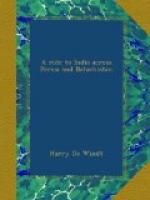The morning following my arrival, I was startled by the apparition at my bedside of a swarthy, wild-looking Afghan sowar—a messenger from the Wazir, to say that his Highness the Khan wished to make my acquaintance, and would receive me, if convenient, at three o’clock that afternoon. It had not been my intention to solicit an interview, for, from all accounts, the Khan is anything but friendly towards Europeans, Englishmen in particular. To refuse, however, was out of the question. The morning was therefore devoted to cleaning up, and getting out a decent suit of wearing-apparel; while my Beila escort, who evidently had uncomfortable forebodings as to the appearance of the Beila uniform in the streets of Kelat, polished up arms and accoutrements till they shone like silver, and paid, I noticed, particular attention to the loading of their rifles and revolvers.
About midday the Wazir made his appearance to conduct me to the palace. He was a fat, paunchy old man, with beady black eyes and a shy, shifty expression, very unlike my cheery little friend at Beila. After the usual preliminary questions as to who I was, my age, business, etc., he anxiously inquired after the health of Mr. Gladstone, and somewhat astonished me by asking whether I was a Liberal or Conservative. “You have some Beila men with you, I see,” said the Khan’s adviser, who spoke English perfectly. “Don’t let his Highness see them.” I could not, after such a speech, allow my faithful escort to enter the city without warning. But it had little effect. “Let the dogs do what they like,” was the reply. “We shall not let the sahib go alone.”




